
Navigating Learning Disabilities at 18: A Journey to Success
Turning 18 is a significant milestone in a young person’s life. It’s an age associated with newfound freedoms and responsibilities. However, for those who are also managing learning disabilities, this transition can bring about unique challenges. In this blog post, we will explore the experiences and potential paths to success for 18-year-olds with learning disabilities, shedding light on their struggles, strengths, and the support they may need.
- Understanding Learning Disabilities
Before delving into the experiences of 18-year-olds with learning disabilities, it’s essential to understand what learning disabilities are. Learning disabilities are neurological differences that affect a person’s ability to acquire, process, store, and use information effectively. They are not indicative of intelligence but can significantly impact how an individual learns and performs academically.
- The Challenges Faced
At 18, young adults with learning disabilities often face a host of challenges. These may include:
a. Academic Struggles: Many 18-year-olds with learning disabilities experience difficulties with reading, writing, math, or organizational skills, which can hinder academic progress.
b. Social and Emotional Challenges: The transition to adulthood can be emotionally challenging for anyone, but it can be even more so for those with learning disabilities. They may struggle with self-esteem, anxiety, and social interactions.
c. Navigating Independence: As they become adults, 18-year-olds are expected to become more independent, which can be especially challenging for those with learning disabilities who may need extra support.
- Recognizing Strengths
Despite these challenges, it’s important to recognize the strengths that many 18-year-olds with learning disabilities possess. These can include:
a. Resilience: Many young adults with learning disabilities have developed resilience through years of facing and overcoming obstacles.
b. Creativity: Different ways of thinking can lead to unique problem-solving skills and creativity.
c. Self-Awareness: Learning disabilities often necessitate a deep understanding of one’s strengths and weaknesses.
- Support and Resources
The journey to success for 18-year-olds with learning disabilities often requires a strong support system. Here are some key resources and forms of support they can tap into:
a. Educational Support: Schools and universities can provide accommodations such as extended test time, note-taking assistance, and access to assistive technologies.
b. Counseling and Therapy: Counseling services can help address emotional challenges, while therapy can provide strategies for managing learning disabilities effectively.
c. Parental Support: Parents play a crucial role in helping their children transition to adulthood, providing emotional support and guidance.
d. Peer Groups: Joining support groups or communities of individuals with similar challenges can help 18-year-olds feel less alone and learn from others’ experiences.
- Transitioning to Adulthood
The transition to adulthood can be smoother with careful planning. Some key steps include:
a. Identifying Career Goals: Understanding one’s strengths and interests can help in choosing a career path that aligns with one’s abilities.
b. Seeking Vocational Training: Some 18-year-olds with learning disabilities may benefit from vocational training programs that offer specialized education and job placement services.
c. Independent Living Skills: Learning life skills such as budgeting, cooking, and time management is crucial for independence.
- Advocacy and Awareness
Raising awareness about learning disabilities is vital. By fostering a more inclusive society, we can reduce the stigma associated with these conditions and make resources more readily available to those in need.
Turning 18 is a pivotal moment in a young person’s life, and for those with learning disabilities, it brings both unique challenges and opportunities. With the right support and resources, 18-year-olds with learning disabilities can overcome obstacles and achieve their goals. Understanding their experiences, recognizing their strengths, and advocating for their needs are essential steps towards creating a more inclusive society that empowers all individuals to reach their full potential.
